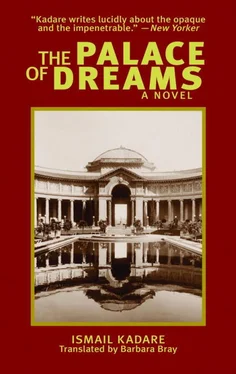Mark-Alem shrugged as if to say he hadn’t chosen the section he was sent to work in. But he thought he detected a secret gleam in his uncle’s eye.
And though the governor had swiftly looked down at his plate, that strange gleam hadn’t escaped the notice of his own sister. It was with some uneasiness that she followed the discussion about the Tabir Sarrail, in which everyone except her son was now taking part.
Yes, everyone except Mark-Alem, though he now spent his days in the very heart of the Tabir… His mother’s mind worked feverishly. Had she spent all that time watching over her son only to throw him in the end into a cage of wild beasts? A place that, despite the honor of his appointment, was really only the blind, cruel, even fatal mechanism they’d all been describing?
Out of the comer of her eye she looked at his emaciated features. How was her Mark-Alem going to find his way in that chaos of dreams, those misty fragments of sleep, those nightmares from the brink of death? How had she ever come to let him enter such an inferno?
All around him the conversation about the Tabir Sarrail continued, but he felt too weary to listen. Kurt and one of the cousins were discussing whether the revival of the Palace’s influence was related to the present crisis in the Ottoman Superstate or merely the result of chance. Meanwhile the governor kept saying: “Come, come—let’s talk about something else….”
Finally the visitors rose to go and have coffee in the drawing room. They didn’t go home till quite late, around midnight. Mark-Alem went slowly up to his room on the second floor. He didn’t feel at all like sleeping, but that didn’t bother him unduly. He’d been told newcomers to the Tabir usually suffered from insomnia for the first couple of weeks. After that they were all right again.
He stretched out on the bed and lay there for some time with his eyes open. He felt quite calm. It was a painless kind of insomnia, cold and smooth. And it wasn’t the only thing about him that had changed. His whole being seemed to have undergone a transformation. The great clock at the corner of the street struck two. He told himself that at about three, or half past three at the latest, he would eventually fall asleep. But even if he did, from which file would he choose his dreams tonight?
That was his last thought before he dropped off.
* Members of the procession escorting a bride.
Much sooner than he expected, even before there was any sign of spring—and he’d thought he’d spend spring at least in Selection, and possibly even summer as well—Mark-Alem was transferred to Interpretation.
One day, before the bell rang for the break, he was told the Director-General wanted to see him. “What about?” he asked the messenger—though, thinking he saw a sardonic smile on the man’s face, he immediately regretted it. Clearly you didn’t ask that kind of question in the Tabir Sarrail.
As he went along the corridor he was assailed by all sorts of doubts and surmises. Could he have made some mistake in his work? Could someone have appeared from the depths of the Empire and come knocking at every door, going from office to office and vizier to vizier, claiming that his valuable dream had been thrown in the wastepaper basket? Mark-Alem tried to remember the dreams he’d rejected recently, but couldn’t recall any of them. Perhaps that wasn’t it, though. Perhaps he’d been summoned because of something else. It was nearly always like that. When you were sent for, it was almost invariably for some reason you could never have dreamed of. Was it something to do with breaking the secrecy rule? But he hadn’t seen any of his friends since he’d started working here. As he asked his way through the corridors he felt more and more strongly that he’d been in this part of the Palace before. He thought for a while this might be because all the corridors were identical, but when he finally found himself in the room with the brazier, where the square-faced man sat with his eyes glued to the door, he realized it had been the Director-General’s office he had knocked at on his very first day in the Tabir Sarrail. He’d been so absorbed in his work since then that he’d forgotten it even existed, and even now he had no idea what the square-faced man’s job was in the Palace of Dreams. Was he one of the many assistant directors, or the Director-General himself?
Mark-Alem stood in front of him, almost petrified with apprehension, and waited for the other to speak. But the official continued to contemplate the door, at about the height of the doorknob. Although he was by now familiar with this mannerism, Mark-Alem did wonder for a moment whether the man was waiting for someone else to arrive before he explained why he’d sent for him. But finally the man did tear his eyes away from the door.
“Mark-Alem…” he said in a very low voice.
Mark-Alem broke out in a cold sweat. He didn’t know what attitude to take. Should he say, “At your service,” or use some other polite formula? Or just stand and wait for the ghastly news to be revealed to him? He was now convinced he could only have been summoned about something disagreeable.
“Mark-Alem…” reiterated the other. “As I told you on your first day here, you suit us.”
My God! thought Mark-Alem. That strange phrase… I never thought I’d hear it again….
“You suit us,” the senior official went on, “and that’s why from today you’re being transferred to Interpretation.”
Mark-Alem felt a buzzing in his ears. His eyes shifted involuntarily toward the brazier standing in the middle of the room. The embers were almost buried in ash, and seemed to be wearing a sardonic smile—the kind that appears on some people’s faces accompanied by half-closed eyes. It was these embers that had consumed Mark-Alem’s letter of recommendation on the memorable day of his arrival. They now seemed to be assuming an air of indifference.
“You’re quite right not to show any satisfaction,” said the voice.
And Mark-Alem wondered, How am I reacting?
As a matter of fact he didn’t feel any pleasure, though he knew he ought to be grateful, the more so as he’d been half dead with anxiety up till a few moments ago. He opened his mouth to say something, but the official’s voice interrupted.
“I understand. If you don’t express any pleasure it’s because you’re so conscious of the responsibility attaching to your new duties. Interpretation is rightly known as the nerve center of the Tabir. The salaries there are higher, but the work is more difficult—you’ll often have to do overtime—and above all the responsibility is greater. Nevertheless, you must realize you’re being done a favor. Don’t forget that the road to the heights in the Tabir Sarrail passes through Interpretation.”
For the first time he actually looked at Mark-Alem. Not at his face, but at his midriff—where the door handle would have been if he’d been a door.
The road to the heights in the Tabir passes through Interpretation, thought Mark-Alem to himself. He was about to say he might not be up to the requirements for so difficult a task as deciphering dreams when the other, as if he’d read his thoughts, got in first.
“The interpretation of dreams as practiced in the Tabir Sarrail is difficult, very difficult. It bears no resemblance to ordinary, popular interpretation—a snake a bad omen, a crown a good one, and so on. Nor has it anything in common with all the books on the subject. Interpretation in the Tabir is on a quite different and much higher level. It uses another kind of logic, other symbols and combinations of symbols.”
Читать дальше













